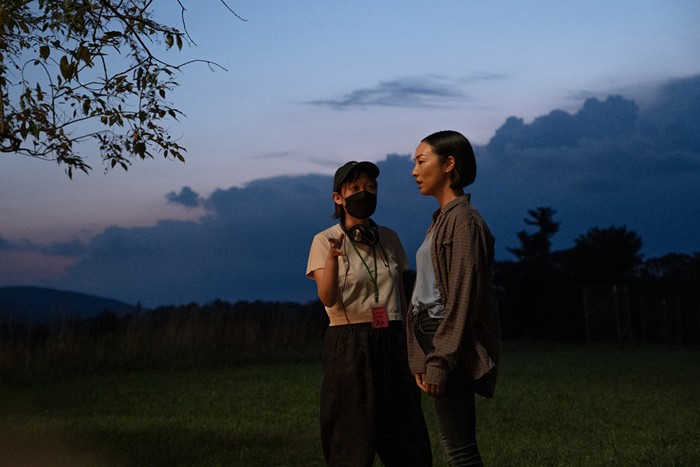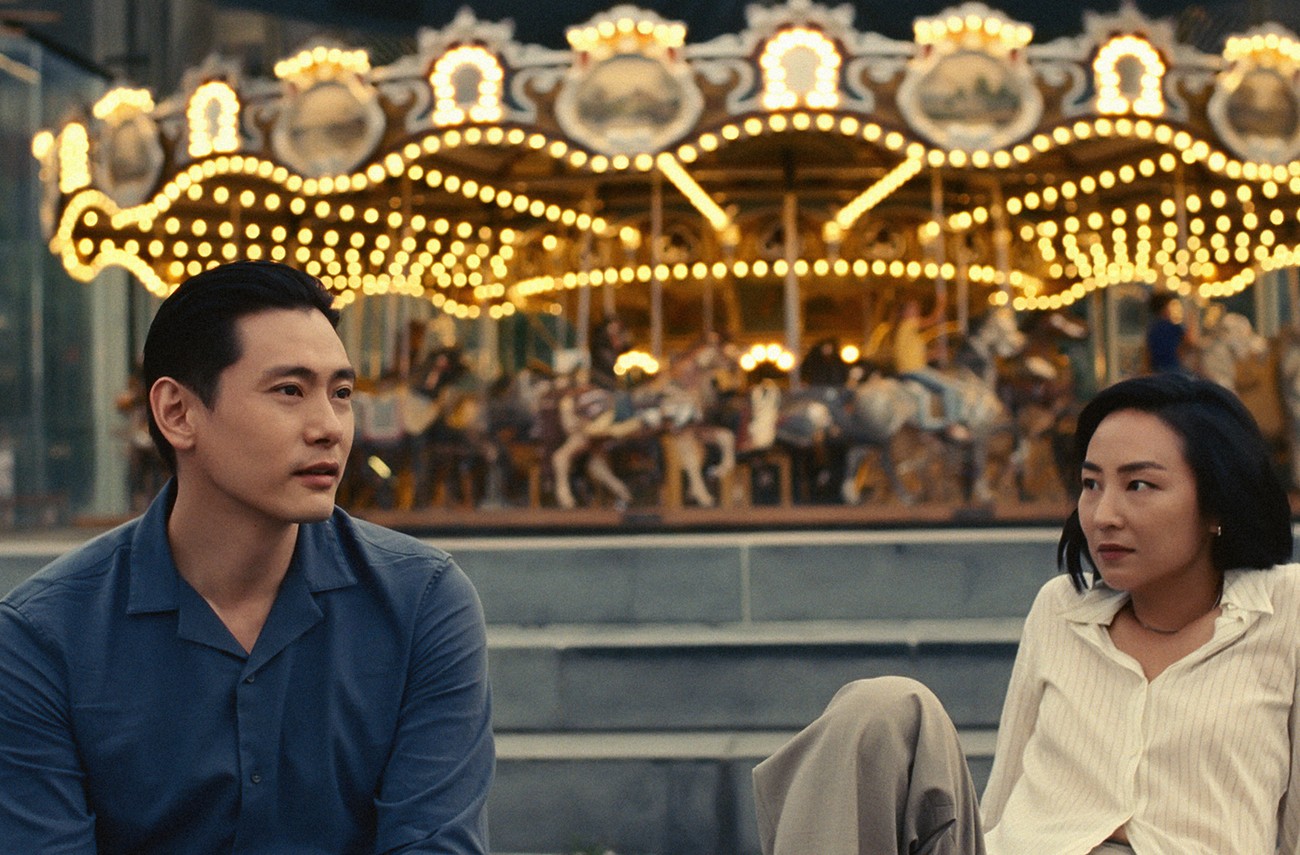When writer-director Celine Song’s acclaimed debut feature Past Lives recently opened the 49th Seattle International Film Festival, it represented a fittingly poetic full-circle moment of sorts. It turns out this was not the only time Song had come through the region with one of her stories to share.
“I keep wanting to tell people, I was here for the first play I had ever written and it was one of the first regional productions of it," Song said with a laugh. "So I was here and I was crashing at my artistic director’s apartment, it was one of those things. It was called The Feast and it was about cannibalism.”
While Past Lives is very much not about cannibalism, it is a film that audiences far and wide have been eating up over its festival run. It tells the story of a decades-long relationship between two childhood friends, Nora (Greta Lee) and Hae Sung (Teo Yoo), who are separated after Nora’s family emigrated from South Korea. It is one of the best films of the year and one of the best debuts in recent memory.
I sat down with Song while she was in town for SIFF to learn more about Past Lives, which opens in Seattle on June 15.
This interview has been edited for length and clarity.
There is this assumption that going from theater to film is a big leap, but you’ve written characters and stories before. As opposed to asking what was different about the experience, I wanted to ask, what did you take from playwriting and apply to filmmaking?
I think what you’re saying about character and story and dialogue and things like that, and also how to just play out a scene, that is something that you know so much because that’s the only thing you really lean on in making a play. The other part of it that I really thought was transferable, when it comes to skills and experience, was editing. I felt like I had done that a hundred times.
In terms of blocking, there were just so many scenes in the film where the way the camera moves with the way characters were talking felt so naturalistic. What was the approach you took in coming from the stage, where you’re often in movement, and then introducing a camera into that?
Part of what you’re able to do in theater is that the actors’ performances are the camera. You direct focus by what the actors are doing. Some of it is light, some of it is sound, but it’s mainly what they do. The main thing I was feeling when I was making the film is that it has to feel as authentic as possible to what it’s like to experience life. That was what dictated how I would block it. So much of the conversation was “What feels real?” or “What would you do?” or “What would the characters do?” and how could we make sense of it, which is in the building blocks of what you have to do in theater. So it was really transferable in that way.
When it came to the camera, it was about doing this without anybody in the audience thinking about the camera. It has to feel like we are part of our conversation. Like that scene in the kitchen and the bathroom, part of it is I want us to all forget that we are voyeurs in this room where we have a camera. We want it to feel like this is just what it's like to be in the room with them for real.
That makes me think of the opening scene, with the camera just observing them from across the bar while we hear two people quietly speculating about what is happening with the main characters.
What I wanted from that scene is for the audience to feel immersed and for them to feel implicated too. I wanted them to feel like they were in a detective novel, where the most mundane, everyday story of these people is a bit of a curiosity. The film is basically giving you the answer. It might not be a simple answer, and it is probably a very complex answer, but the story is supposed to put you through it, so when we’re back in that scene in the film, we’re able to know the answer to the question that we asked.
While I was watching Past Lives, which is obviously its own distinct work, I still found myself thinking about Kelly Reichardt because I’d spoken to her about her latest film Showing Up, which also has John Magaro in it, funnily enough. I like to imagine he walked from one movie to the next.
Oh my god, yeah, he just shaved a little bit [laughs].
Were there any films you looked to or drew inspiration from in constructing your first feature? There is obviously the wonderful reference to Eternal Sunshine of the Spotless Mind.
Part of it is I am trying to discover my own language as a filmmaker and this film in particular needed its own language because it is a unique way of telling this story. To me, it was so much more about learning its own beat. But, of course, I feel like I was pulling from many different films. I couldn’t really name one movie, but it was more like I was pulling from many different movies.
I was thinking of My Dinner with Andre when it came to the scene at the bar. When I was thinking about how to put that scene together, that was a reference for that, and I asked everybody to watch that. What I love about My Dinner with Andre is you think you’re just having an ordinary conversation, a kind of mundane conversation, and at one point you just kind of slip. You barely notice and then you're in the deep end. That conversation has to feel that way, and the revelations are going to be punctuated with the most delicate hand. The most devastating parts of conversations can happen in the most subtle way, in a way of how it enters our lives. When [Song] Hae-sung says, “I didn’t think that liking your husband would hurt this much,” there is a way to do it where it is treated like it’s a really dramatic thing. But the truth is that’s just not how conversations happen. Sometimes the most devastating thing can be said in the simplest way you don’t see coming. You put it together in a way where you’re slipping in, slipping in, slipping in until you’re in a really deep place with someone.
Then the opening shot, which is a very difficult performance that Greta [Lee] had to do, where she turns and breaks the fourth wall, I was thinking about Breaking the Waves and the opening where she breaks the fourth wall. She does it a couple times in that film, but there was something about it that is a bit of a welcome, but it is also a bit of an implication, a little confrontation.

Speaking of Greta, I had first seen her in the Netflix series Russian Doll, but here there are just so many more conversation scenes where she embodies a naturalness that doesn’t feel written, though I’m sure it is. How much of the film was you collaborating with her on what the dialogue would be, and how we would get these moments that sneak up on you?
When we were rehearsing, I pretended like I was more open to any diversion from the script than I learned that I am [laughs]. Basically, they had to do everything more perfect. So that was the process. Part of it is in the performance of the thing. Some of this language is about an extraordinary time in somebody's life, but it just has to be believable. It has to be something that doesn’t take the audience out. To me, that’s what guides a performance. The thing I’m not asking them for is a showy display of emotion or a wild performance. Some of it has to be that, yes, we know the meaning behind the thing, but we’re gonna say it like “Give me that glass of water.” Right? I know you’re asking them to open their heart, but you’re going to say it like you’re just asking them to pass the salt. It’s a dance around how to make it believable for the audience so they have room to enter.
Make something ordinary feel weighty. An accumulation of small moments.
Right.
I’m sure you’re going to get asked this a lot, but what is it you are hoping to do next?
I actually think that I’m going to make movies now. It’s really because it feels like I fell in love with it, or I fell in love with a new part of my work. It’s like I have a new lover or something. I just feel that connected to it. It was just such a discovery and a revelation for me, too. To be like, “Man, this is the shit I like. This is the shit I wanna do.”
Past Lives opens Thursday, June 15 at local Seattle theaters.



















